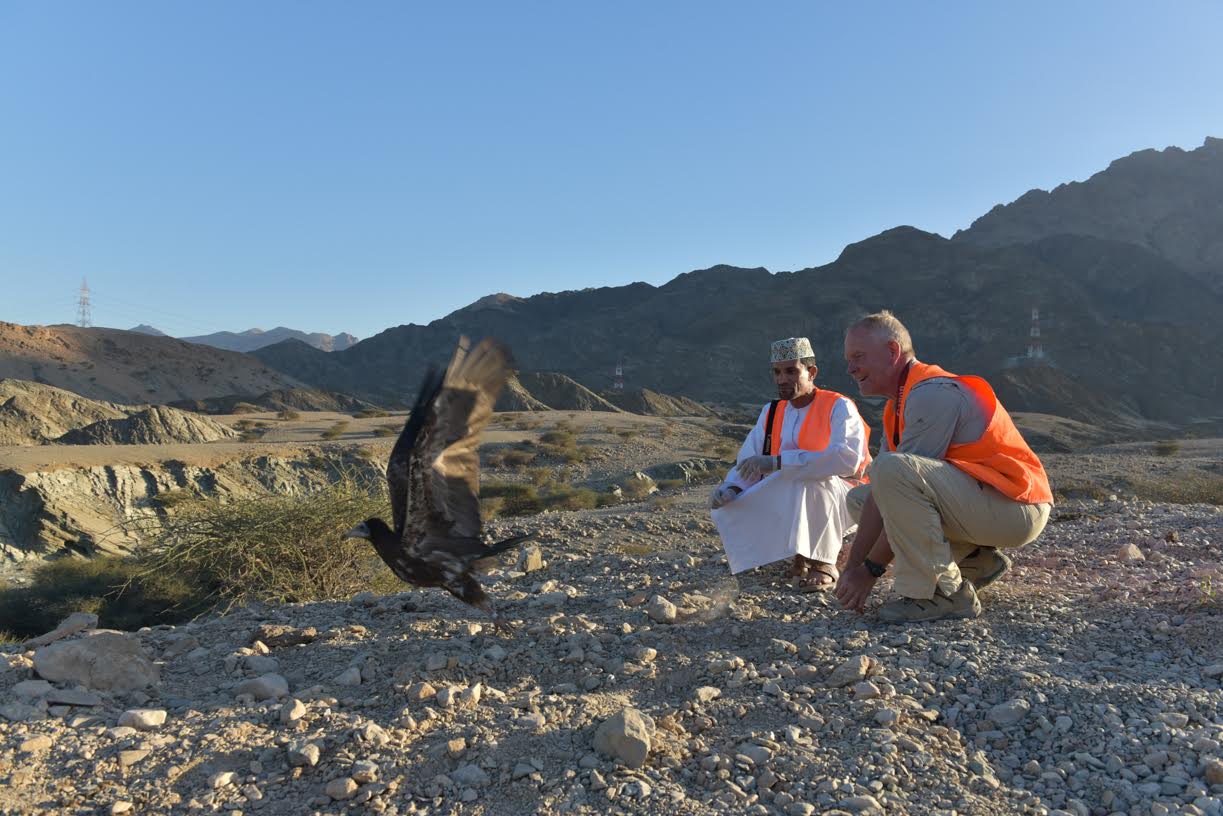Economy
Environment Society of Oman fits two Egyptian vultures with GPS tags
The Environment Society of Oman (ESO) successfully fitted two juvenile Egyptian Vultures with solar powered GPS radio tags in January 2016 as part of research to better understand the ecology of this endangered species.

The Environment Society of Oman (ESO) successfully fitted two juvenile Egyptian Vultures with solar powered GPS radio tags in January 2016 as part of research to better understand the ecology of this endangered species. Launched as part of the Society’s Egyptian Vulture Research and Conservation project, the tracking of these birds will help us identify the birds’ habitats, important congregations, main threats, and boost conservation efforts.
On 16th of February 2016, the transmitter indicated that one of the birds had stopped moving. A team from the Environment Society of Oman visited the GPS location of the bird in Al Amerat to find a lifeless bird. There were no obvious clues as to the likely cause of death. Juvenile mortality rate in this and other birds is naturally high (70-90%). Although it may have died of natural causes, electrocution, poisoning or shooting are not to be excluded. Although gaps exist, through satellite tracking more information is being gathered on when and where these vultures move and on the causes of mortality. The second bird is still moving around northern Oman, and was most recently in the area of Tahwa, in Al Sharqiyah Governorate. The bird’s movement and updates about the project can be found at: http://egyptianvultureoman.blogspot.co.at/.
Nicknamed the “Pharaoh’s Chicken”, Egyptian vultures are distributed across southwestern Europe, northern and central Africa, Arabia, India, eastern Europe and central Asia. As a direct result of accidental and planned poisoning, electrocution on medium voltage power lines, persecution, poaching and habitat destruction, Egyptian vulture is globally endangered.
According to the International Union for Conservation of Nature (IUCN), Egyptian vulture has declined in virtually all parts of its range; experiencing a 90% decline in India during the last decade; a 50% decline in Europe over the last three generations; alongside significant declines in their African and Arabian populations. However, ESO research has shown that Oman may be a stronghold, and as such has the potential to help contribute to global conservation efforts.
Maia S. Willson, ESO Research and Conservation Manager, said: “Tracking the animal’s movement is helping us understand their habitat use and the threats to which they are exposed, whether natural or human-induced. Through satellite tracking, we were able to determine the precise location of the bird, and determine more accurately the reasons they might die. It is crucial for the tagging programme to continue, as only long-term information will enable us better understand their movements and ecology.’
Dr. Michael McGrady, Principal Investigator for the project, added: “Egyptian vultures are scavengers that provide an important ecosystem service by consuming biological waste created by humans, which provides benefits to human health and the health of domestic livestock. We want to better understand the movements of vultures in Oman and the real and potential impact of waste management and power distribution networks on vultures. Comprehensive plans for waste management and power distribution could both benefit from vulture conservation.”
ESO began researching Egyptian Vultures in early 2012, when the Society began surveying populations on Masirah Island. It has tagged four juvenile Egyptian Vultures since 2015 in collaboration with International Avian Research, revealing valuable information about Egyptian Vultures in Oman.
-

 Banking & Finance1 month ago
Banking & Finance1 month agoOman Oil Marketing Company Concludes Its Annual Health, Safety, Environment, and Quality Week, Reaffirming People and Safety as a Top Priority
-

 News1 month ago
News1 month agoJamal Ahmed Al Harthy Honoured as ‘Pioneer in Youth Empowerment through Education and Sport’ at CSR Summit & Awards 2025
-

 Economy2 months ago
Economy2 months agoPrime Minister of India Narendra Modi to Visit the Sultanate of Oman on 17-18 December
-

 Economy2 months ago
Economy2 months agoOman’s Net Wealth Reaches $300 Billion in 2024, Poised for Steady Growth
-

 News2 months ago
News2 months agoIHE Launches Eicher Pro League of Trucks & Buses in Oman
-

 News2 months ago
News2 months agoLiva Insurance Honored with ‘Insurer of the Year’ Award for 2025
-

 OER Magazines1 month ago
OER Magazines1 month agoOER, December 2025
-

 News1 month ago
News1 month agoAI Security Conference 2025 Hosted by Securado Highlights the Changing Cybersecurity Landscape































You must be logged in to post a comment Login